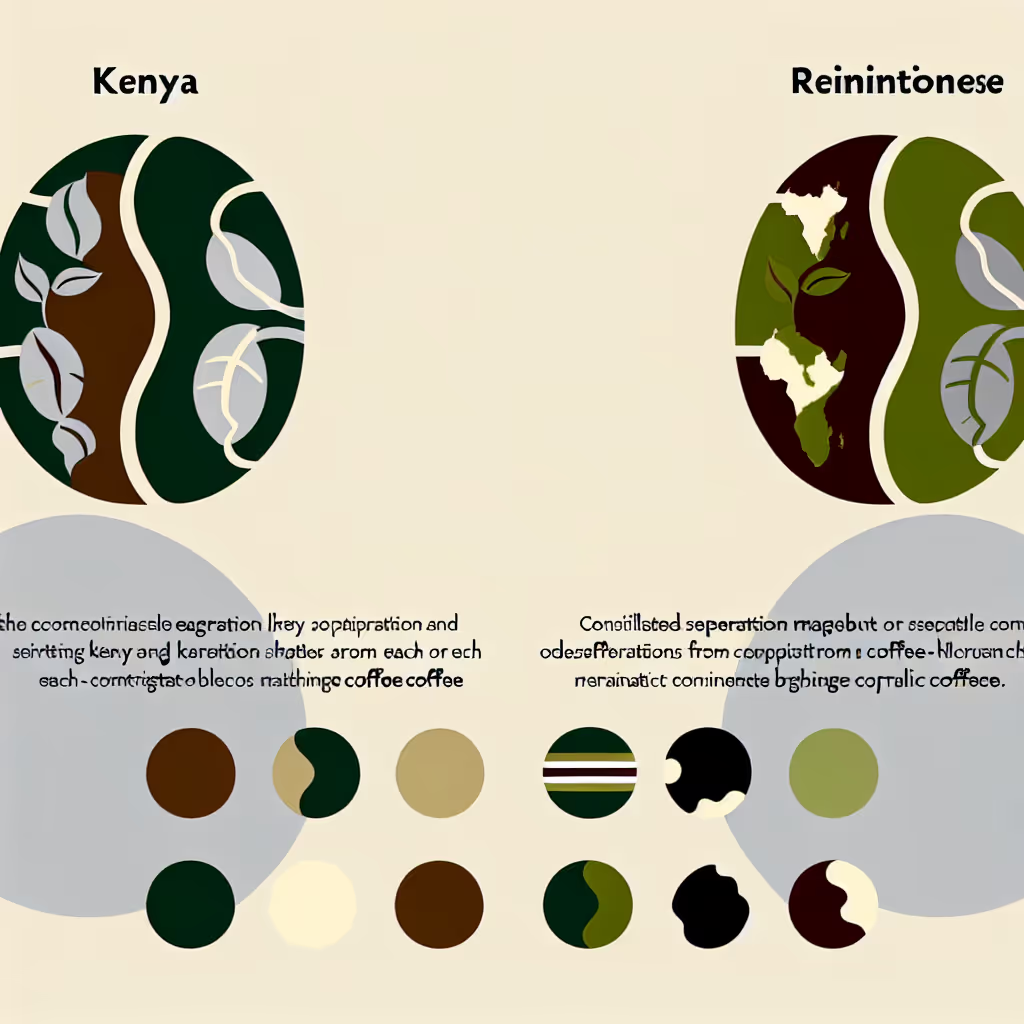Kenyan Vs. Ecuadorian Coffee
This comparison explores the unique qualities of Kenyan and Ecuadorian coffees, both grown in high-altitude regions with volcanic soil. We'll examine their flavor profiles, processing methods, and optimal brewing techniques for coffee connoisseurs.

Brief Description
Kenyan coffee is renowned for its bright acidity, full body, and complex flavor profile. Grown in the rich volcanic soils of the Central Highlands, these beans benefit from ideal climate conditions and meticulous processing. The result is a cup that's bold, wine-like, and often described as the 'connoisseur's choice'. With notes ranging from blackcurrant to citrus, Kenyan coffee offers a truly unique and memorable tasting experience.
Ecuadorian coffee is a hidden gem in the world of specialty coffee. Grown in the diverse microclimates of the Andes Mountains, these beans offer a unique flavor profile that combines bright acidity with a smooth, full body. The country's rich volcanic soil and ideal growing conditions contribute to the production of high-quality Arabica beans, known for their complex flavors and aromatic qualities. Despite being a smaller producer compared to its neighbors, Ecuador is rapidly gaining recognition for its exceptional coffee.
Importance of Comparison
Comparing Kenyan and Ecuadorian coffee is crucial for coffee enthusiasts seeking to expand their palate. These origins offer distinct flavor profiles shaped by their unique growing conditions. Understanding the differences helps consumers make informed choices, whether they prefer the bold, wine-like acidity of Kenyan beans or the complex, smooth body of Ecuadorian coffee.
Key Attributes
Origin
Kenyan
Ecuadorian


Consumer Guide
When choosing between Kenyan and Ecuadorian coffee, consider your flavor preferences. Kenyan coffee is known for its bright acidity and bold flavors, with notes of blackcurrant and citrus. It's ideal for those who enjoy a vibrant, complex cup. Ecuadorian coffee offers a smoother experience with chocolate and floral notes, perfect for those who prefer a balanced, full-bodied brew. For brewing, both origins excel in pour-over and French press methods. Kenyan coffee shines in cold brew, while Ecuadorian beans make excellent espresso. Consider the processing method as well: Kenyan coffee often undergoes double fermentation, while Ecuadorian beans offer a variety of processing options, including natural and honey methods.
Expert Opinions
Coffee expert Maria Rodriguez notes, 'Kenyan coffee is often considered the pinnacle of brightness and complexity in the coffee world. Its unique double fermentation process contributes to its distinctive flavor.' On Ecuadorian coffee, master roaster John Smith states, 'Ecuador's diverse microclimates produce beans with incredible depth. The combination of chocolate notes and bright acidity makes it a versatile choice for various brewing methods.'
FAQs
Kenyan coffee is known for its bright acidity with blackcurrant and citrus notes, while Ecuadorian coffee offers a smoother profile with chocolate and floral flavors. Both have complex taste profiles, but Kenyan tends to be bolder, while Ecuadorian is often more balanced.
Both coffees benefit from high-altitude growing conditions and volcanic soil. Kenyan coffee, grown at 1400-2100m, develops its bright acidity and complex flavors. Ecuadorian coffee, grown at 1200-2200m, benefits from diverse microclimates, contributing to its unique flavor profile and smooth body.
Both Kenyan and Ecuadorian coffees excel in pour-over and French press methods. Kenyan coffee is particularly good for cold brew due to its bright acidity. Ecuadorian coffee performs well as espresso, thanks to its balanced flavor and full body.
Kenyan coffee often undergoes a unique double fermentation process, followed by sun-drying. This contributes to its complex flavor profile. Ecuadorian coffee offers more variety in processing, including washed, natural, and honey methods, each imparting different characteristics to the beans.
Ecuador produces significantly more coffee annually, with about 200,000 metric tons compared to Kenya's 50,000 metric tons. However, Kenyan coffee is often considered more exclusive due to its smaller production and unique flavor profile.
Yes, both Kenyan and Ecuadorian coffees are often classified as specialty coffees. Kenyan coffee is renowned for its exceptional quality and unique flavor profile, while Ecuadorian coffee is gaining recognition in the specialty market for its diverse and high-quality beans grown in ideal conditions.
Conclusion
Both Kenyan and Ecuadorian coffees offer unique and rewarding experiences for coffee enthusiasts. Kenyan coffee stands out for its bright acidity, complex flavors, and bold profile, making it a favorite among connoisseurs. Ecuadorian coffee, with its smooth body and balanced flavor, is rapidly gaining recognition in the specialty coffee world. Your choice between the two may depend on whether you prefer a bolder, more acidic cup (Kenyan) or a smoother, more balanced brew (Ecuadorian). Whichever you choose, both origins promise a high-quality coffee experience that showcases the best of high-altitude Arabica beans.






